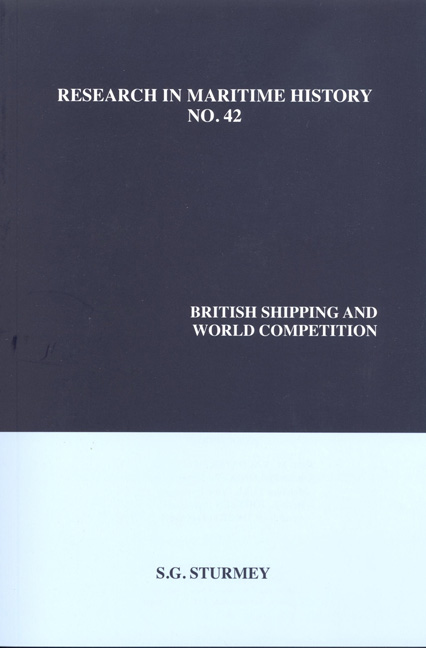Book contents
- Frontmatter
- Table of Contents
- Series Editor's Foreword
- About the Author
- Preface
- Figures and Tables
- Chapter 1 The Problem Defined
- Chapter 2 High Water: The Pre-1914 Period
- Chapter 3 War and Reconstruction
- Chapter 4 The Troubled Years: The Interwar Period
- Chapter 5 Nationalism in Shipping in the Interwar Years
- Chapter 6 The Birth of the Liberty
- Chapter 7 The Prosperous Age: The Postwar Period
- Chapter 8 Enemies of Competition in the Postwar Years
- Chapter 9 Flags of Convenience
- Chapter 10 Economics of Shipping Enterprises
- Chapter 11 Shipowning and Resource Allocation
- Chapter 12 Labour Relations and Labour Costs (by Basil Mogridge)
- Chapter 13 The Conference System
- Chapter 14 The Structure of the British Industry
- Chapter 15 The Question Answered
- Epilogue The Future
- Appendix The Contribution of British Shipping to the Balance of Payments
- Bibliography
- Index
Chapter 2 - High Water: The Pre-1914 Period
- Frontmatter
- Table of Contents
- Series Editor's Foreword
- About the Author
- Preface
- Figures and Tables
- Chapter 1 The Problem Defined
- Chapter 2 High Water: The Pre-1914 Period
- Chapter 3 War and Reconstruction
- Chapter 4 The Troubled Years: The Interwar Period
- Chapter 5 Nationalism in Shipping in the Interwar Years
- Chapter 6 The Birth of the Liberty
- Chapter 7 The Prosperous Age: The Postwar Period
- Chapter 8 Enemies of Competition in the Postwar Years
- Chapter 9 Flags of Convenience
- Chapter 10 Economics of Shipping Enterprises
- Chapter 11 Shipowning and Resource Allocation
- Chapter 12 Labour Relations and Labour Costs (by Basil Mogridge)
- Chapter 13 The Conference System
- Chapter 14 The Structure of the British Industry
- Chapter 15 The Question Answered
- Epilogue The Future
- Appendix The Contribution of British Shipping to the Balance of Payments
- Bibliography
- Index
Summary
Conditions of Supremacy
British-owned shipping dominated the ports and sea lanes of the world in the years immediately prior to the First World War, the supremacy being based on four factors:
(a) Colonies
First and foremost was the British colonial trading policy. The Empire constituted a trading area from which Britain drew imports of raw materials and food and to which she supplied manufactured goods and emigrants. This provided the opportunities for the employment of a shipping fleet, opportunities which, in the days before cables and radio, were more easily grasped by British than by foreign shipowners. The Navigation Acts, which from the close of the sixteenth century to 1849 kept the intra-imperial trade in the hands of British ships and trades from foreign countries in the hands of either British ships or ships of the country of origin of the goods concerned, led to “the early diversion of British shipping to the ocean trades” which “was an important contributory cause to its great expansion after the Napoleonic wars.” Colonial development also affected Britain's ability to build marine steam engines, the original engine builders being largely the companies which had gained their know-how in producing machinery for crushing sugarcane in the West Indies.
(b) Industrialization
Second, the course of industrialization in Britain provided the developments and knowledge in engineering and metal using which enabled Britain to build iron steamships. During the earlier part of the nineteenth century, the American merchant fleet, built cheaply from soft woods, was rising in importance. It threatened to eclipse the British fleet built chiefly of hard woods, the indigenous supplies of which were approaching exhaustion. The limitations imposed on the size of ships by the relatively low strength of wood gave an advantage to iron and later steel ships and to the country which could produce those metals. Further, the economic superiority of steamships on an increasing number of trade routes as marine engines were developed enabled Britain to consolidate her lead in world shipbuilding and, as the bulk of the world trade was British trade, in world shipowning also. Industrialization in Britain had led to the extensive development of coalfields, and coal provided a high-quality, indigenous fuel for British steamships and an outward bulk cargo for ships dispatched to bring home food and raw materials.
- Type
- Chapter
- Information
- British Shipping and World Competition , pp. 11 - 30Publisher: Liverpool University PressPrint publication year: 2009

